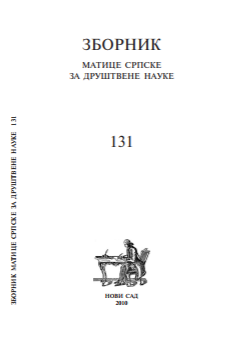УБРЗАЊЕ МОДЕРНИЗАЦИЈЕ БРАЧНОСТИ КАО УСЛОВ РЕХАБИЛИТАЦИЈЕ РАÐАЊА У СРБИЈИ
ACCELERATION OF MODERNIZATION OF MARRIAGE AS A CONDITION TO THE REHABILITATION OF PROCREATION IN SERBIA
Author(s): Mirjana V. BobićSubject(s): Politics, Sociology, Family and social welfare, Demography and human biology
Published by: Матица српска
Keywords: Serbia; marriageness; "Second demographic transition"; gender; family; birth; politics;
Summary/Abstract: The first part of the paper shows that Serbia (excluding Kosovo and Metohia), like other Former Yugoslav states, still has not entered „the second demographic transition", even though the decline of the universality of marriage has been registered. Instead of behavioral shift towards postmodern, individualised types and forms of unions, the population of contemporary Serbia resorts to the strategy of passive adaptation to persisting structural barriers, which, in the aggregate, are manifested through: the postponement of marriage and ageing of fertility, practical absence of serial monogamies (high-ranking marriages), with the increase of enlarged family households, while on a demographic level, it causes familiar aggravating effects: long-lasting low fertility rates, negative population growth, depopulation and intensive ageing. Such demographic development has been occurring in a specific context of slow social transformation and globalisation (European and global integration). By making reference to the relevant socio-demographic literature and empirical research (national and international), the second part of the paper examines the hypothesis about relation between the „decline" of traditional family and possible increase of fertility. We wonder whether the acceleration of the individualisation of marriage and family could be one of potential (unused) ways of rehabilitation of procreation in the forthcoming period, with determined generators of these processes, such as: modifications in the sense of gender equality/flexibility and decrease of the strict intergenerational cohesion, for the purpose of accepting different, pro-active and personally accountable pattern of life? This is the latest innovation in modern, interdisciplinary demography, which relevant authors created on the basis of the analysis of abundant empirical records. Finally, the purpose of this paper is not to disregard the significance of practical policies (population, social, housing, health care and others), which the author of this paper supports, but to point out some indirect means of their more efficient implementation.
Journal: Зборник Матице српске за друштвене науке
- Issue Year: 2010
- Issue No: 131
- Page Range: 431-442
- Page Count: 12
- Language: Serbian

